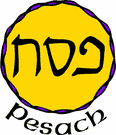Passover
Passover is one of the major holidays in the Jewish tradition. It is observed beginning on the 15th day of Nissan. The festival lasts for a solid week. (On the Western Calendar for 2026, this is from sunset on April 1 to nightfall on April 9.)
 It is also known by the name Pesach, which comes from the Hebrew word Peh-Samech-Chet, which means "to pass over" or "to spare." This describes the origins of the holiday.
It is also known by the name Pesach, which comes from the Hebrew word Peh-Samech-Chet, which means "to pass over" or "to spare." This describes the origins of the holiday.
 When the ancient Jews were in captivity in Egypt, Yahweh visited a series of plagues on the Egyptians in order to convince the Pharaoh to release the Jews. The last of these plagues was the killing of every firstborn son in the land. Jews were warned ahead of time and marked their houses so that they would be spared. The angels of death saw the markings over the front doors of the Jew's houses and "passed over" those houses, sparing the firstborn sons living within. Jewish people have commemorated this with the festival of Passover ever since.
When the ancient Jews were in captivity in Egypt, Yahweh visited a series of plagues on the Egyptians in order to convince the Pharaoh to release the Jews. The last of these plagues was the killing of every firstborn son in the land. Jews were warned ahead of time and marked their houses so that they would be spared. The angels of death saw the markings over the front doors of the Jew's houses and "passed over" those houses, sparing the firstborn sons living within. Jewish people have commemorated this with the festival of Passover ever since.
One thing that many Jewish people definitely try to avoid during Passover is leavening, which is used to make bread rise. The Jews who were fleeing Egypt were in so much of a hurry that they didn't wait for their bread to rise before they took it with them. And then they were very hungry and so ate the "unleavened," or unrisen, bread. The modern Passover commemorates this by featuring a meal that contains unleavened bread.
The name of this unleavened bread is Matzah. It is made from flour and water and cooked very quickly. The name of the special Passover meal is the Seder. The word seder comes from a Hebrew root that means "order." During the seder, everything must be done in a specific order. The traditional seder includes as many as 15 things to do. Traditional music is often played as well.